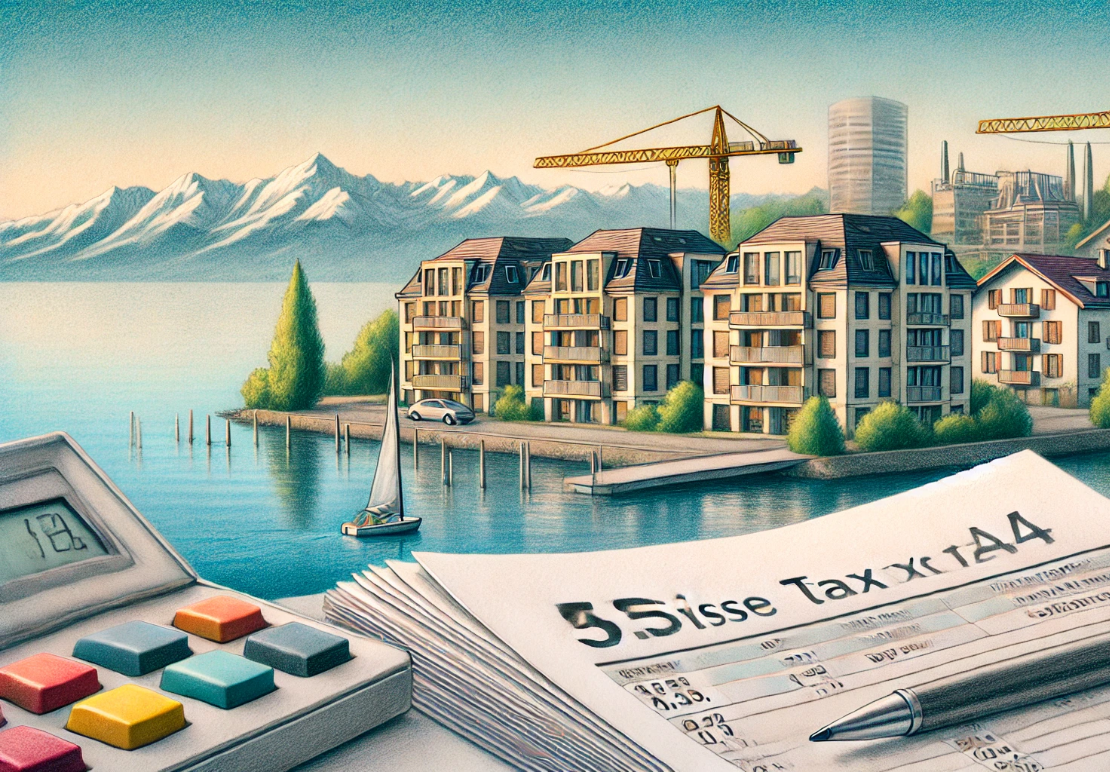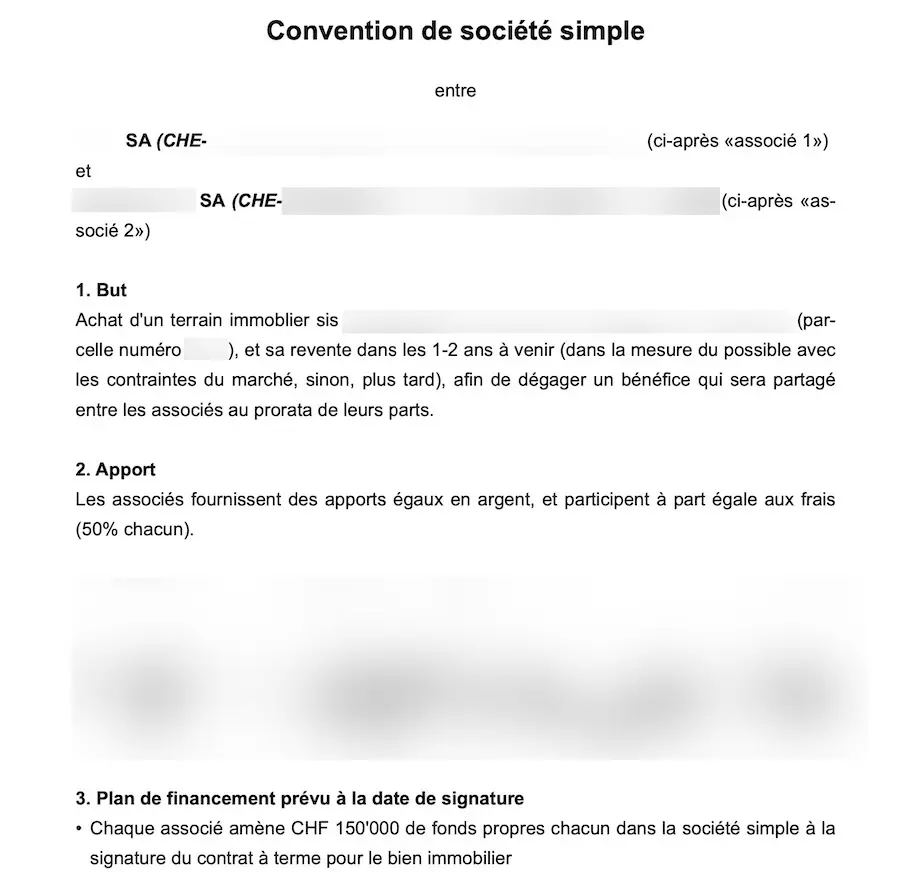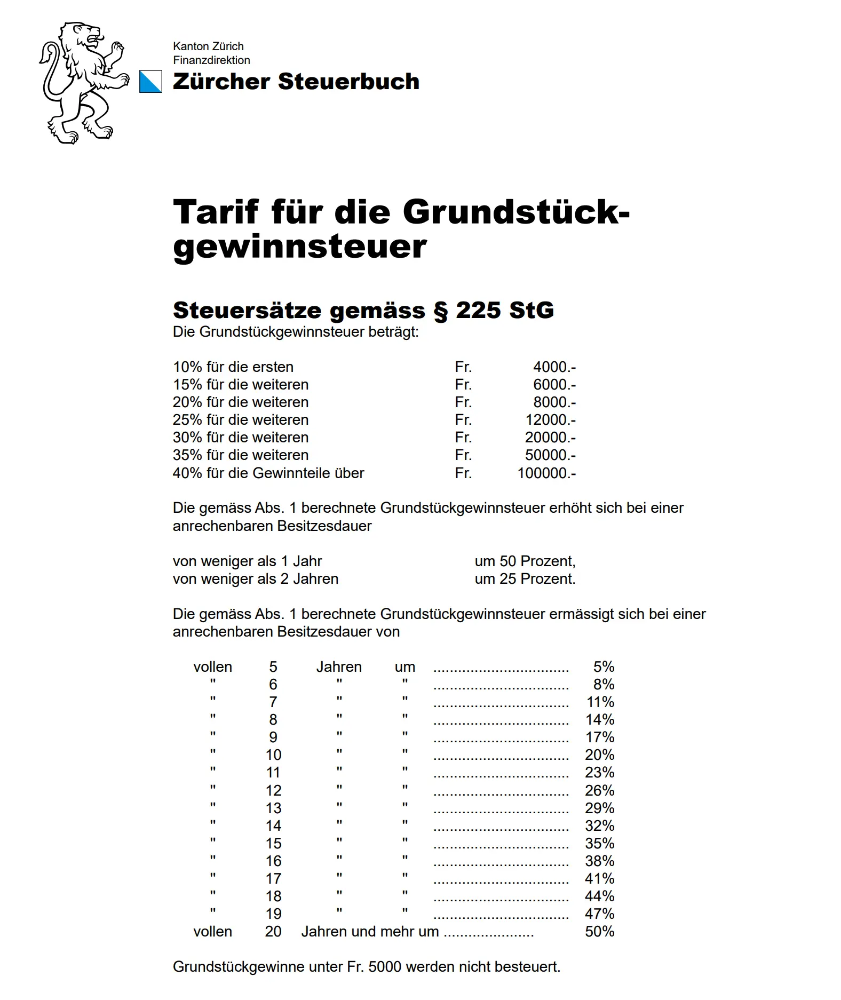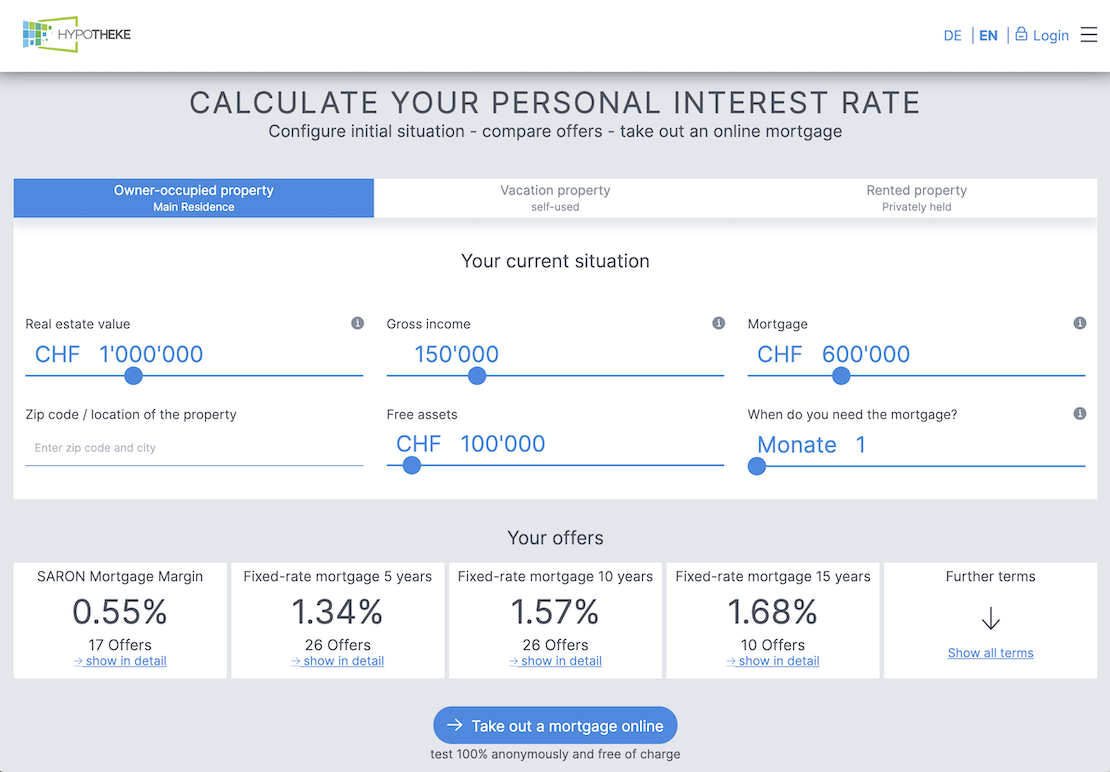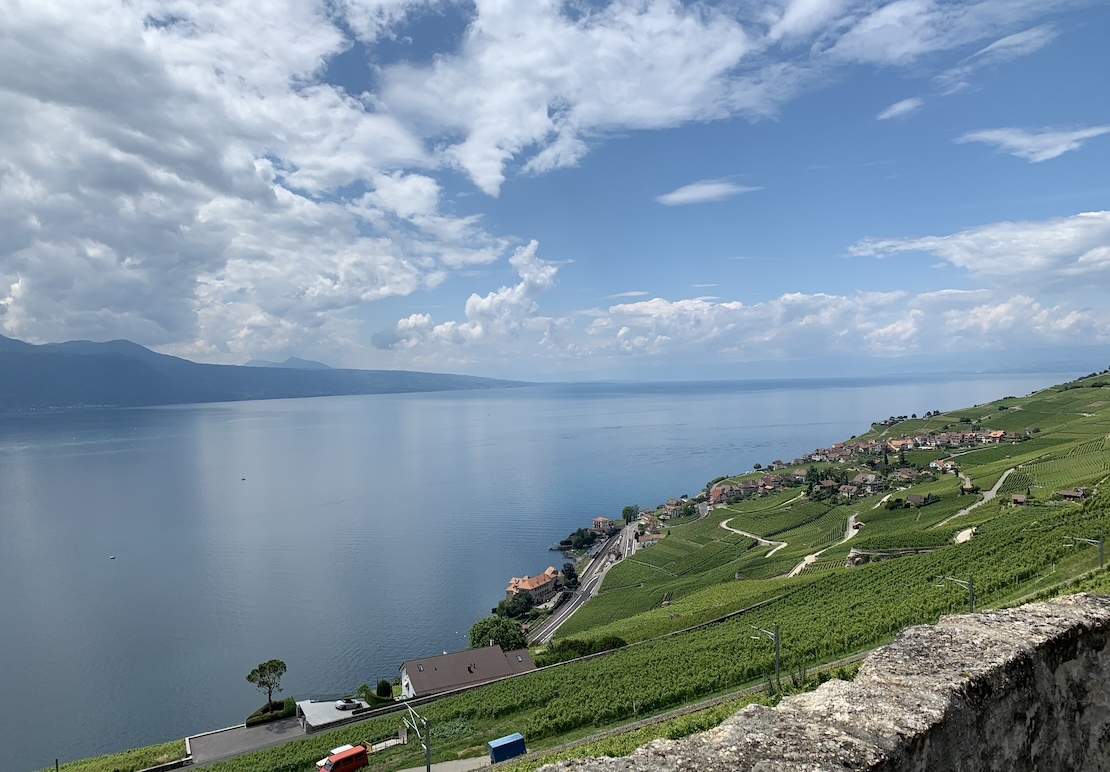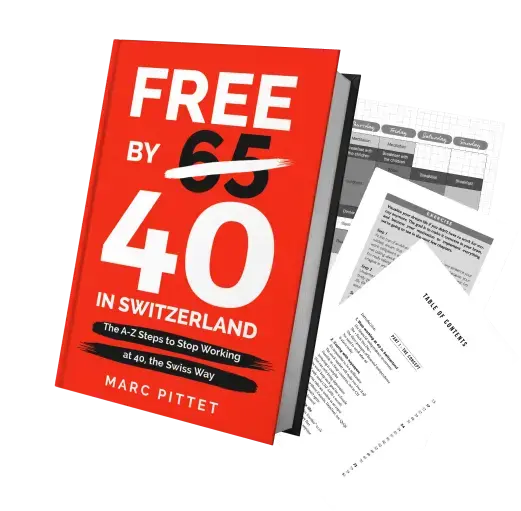What if all our profit got swallowed up by tax after selling our real estate development in Switzerland?
That’s one of the questions that I asked myself (along with many of you in the comments too) at the beginning of this project.
As usual, when I’m stuck on an issue that can have significant consequences (we’re talking about several hundred thousand Swiss francs), I find my answers by paying a professional. So I went to see a lawyer from a well-known firm in the Lausanne area.
But first, let’s go back a bit for the newcomers.
Summary of the situation (incl. capital gains)
Up until now, we had only invested in rental real estate. Then, an opportunity came along to get involved in a Swiss real estate development.
The key points:
- We set up a general partnership, established through a partnership agreement (also called “convention”)
- This general partnership links our respective individual limited companies (we haven’t bought anything under our private names)
- We each put in 50% of the funds (= CHF 500'000) via our limited companies
- We bought the land with the current building at a price of CHF 3'200'000 (including notary and other costs)
- We’re planning to sell the project with the new construction at CHF 6'500'000
- We’ve estimated a pessimistic margin of CHF 700'000 (so CHF 350'000 per partner) before tax
- The optimistic margin is CHF 890'000, but we’re sticking with the pessimistic margin in order to be conservative
You’ll find all the details of my first development set out in this article.

The 3rd Porsche that a non-frugal investor would buy themselves after a real estate venture like this... (photo credit: Porsche Centre Bristol)
Isn’t there a maximum interest level for loans between individuals?
First of all, I wondered about the legality of our general partnership agreement.
As, with my limited legal knowledge, I thought that the agreement could be similar to a loan between individuals… And from what I knew, the amount of interest on a loan between individuals (in any case, private individuals) was limited by law to around 11-14%…
My lawyer confirmed that a loan with a too-high interest rate could be illegal under article 20 of the Code of Obligations (art. 20 CO).
But, before seeing the contract, she told me about a related-party loan which might better correspond to our situation.
A related-party loan is a loan paid for by participation of the lender in the profit of a company or operation determined by the borrower (in addition to potential interest agreed in advance).
Well well, interesting to know!
In the meantime, I gave her our partnership agreement.
General partnership agreement, or excessive interest?
First of all, my lawyer looked at the legality of our contract.
She checked points like:
- Are there any family/friendship/other links (meaning not linked to business) between the two members of the general partnership?
- Is my partner a private individual or a legal entity? (response B, Jean-Pierre!)
- In which canton are the two companies that form the partnership located (for the tax part)?
- In which canton is the purchased property located (again for the purposes of calculating taxes)?
Check, check, check, and re-check. We were all good.
Although the initial aim wasn’t to check every line of the partnership agreement, it’s always great to have a template checked by a lawyer.
Following that, she confirmed that everything was in order regarding my question about potential excessive interest:
Establishing a general partnership agreement like this is legal, and is not affected by the issue of excessive interest. In fact, in a general partnership agreement, the lender can lose some of what they put in, which is not the case with a loan contract where the interest and capital are repayable whatever happens.
Well, that’s a good thing to have checked!
And the tax on the property capital gain in all that?
My lawyer continued with the property tax question.
She confirmed that our company will only be taxed on the net profit made by the general partnership (and not on the CHF 500'000 contribution) at a rate of 13.79% when completing our tax declaration.
This rate of 13.79% includes Swiss federal tax, cantonal tax and municipal tax.
I’ll cite it here:
There has a been a notable decrease in tax on companies since January 1 2019. Prior to this, the overall rate was over 20%. I should point out that the rate of 13.79% is the average rate for the canton of Vaud. It varies slightly depending on the municipality. It is lower for municipalities with a low tax rate, and slightly higher (around 14%) for municipalities with higher tax rate. So if you count on it being 14%, then you’ll have a good estimate of the amount of tax to plan for.
I quickly whipped out my calculator to do: CHF 350'000 x 14% = CHF 49'000
So the conservative estimate of my total net profit from this real estate development will be CHF 301'000 (= CHF 350'000 - CHF 49'000).
So I say… let’s do it! :)
Pay attention to the details
If you get involved in a similar scheme, my lawyer brought to my attention the importance of correctly declaring a general partnership in the accounts of my Swiss company.
Specifically, you must declare any “Participation in the general partnership” as an asset.
And when it comes to knowing whether to declare that as a current asset or fixed asset, here is her response:
Under art. 959 para. 3 CO 3, current assets include cashflow and the assets that will most probably be realized during the twelve months following the reporting date, in the normal course of business or in another way. All the other assets are classified as fixed assets.
Conclusion
All this contract and tax verification cost me some CHF 1'000 in legal fees…
But I see it more as an investment for my next Swiss property investments where I’ll have a readymade checked and legal partnership agreement template, AND where I’ll be sure of the expected amount of tax on the real estate capital gain in the Vaud canton for a company.
The bonus of all this is that I’ve found a lawyer who is fine with working 100% by email, in a super-efficient manner, without chit-chat over the phone, or, even worse, meetings in their office! She asks a lot (too many! haha) of questions in order to know the full context, but that also shows her professionalism. And she then answers my questions clearly and directly. That’s great for my future legal needs!
In any case, I’m delighted to be able to write the next article where I’ll include a screenshot of my company’s bank account with the final amount of profit from this real estate development.
Stay tuned!
And what about you, are you involved in real estate development? If so, I’d be interested in discussing it over email! And when it comes to lawyers, who do you work with in your region? Are you satisfied with them (efficiency, tariffs)?
FAQ real estate tax in Switzerland
Is there no degressive tax for real estate capital gains in Switzerland?
In Switzerland it’s important to distinguish between whether the owner listed on the property register is acting as a private individual or legal entity. An individual taxpayer will pay tax on the real estate capital gain based on how long they have owned the property (art. 72 LI for the canton of Vaud).
This property tax is separate from the private individual’s income tax.
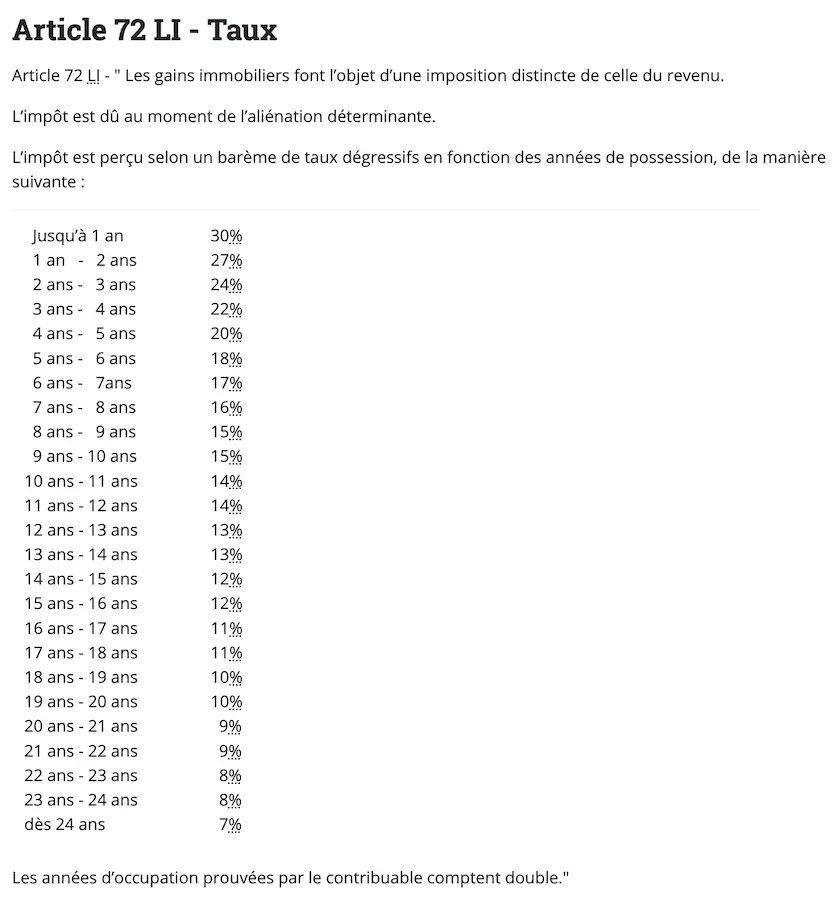
Degressive tax rate according to the number of years of ownership (canton of Vaud, private individual)
On the other hand, if you’re a company (SA or Sàrl), the gains from the real estate value are included in the taxable profits of the company (for the Vaud canton in any case).
How can you pay less tax on real estate gains?
If you bought your property as a private individual, the best way to reduce your tax on property gains is to keep it for as long as possible before selling it. You’ll benefit from a degressive tax rate over time, as described in the point above.
The other option is to buy the property through a company in order to only pay tax on the profit. In a French-speaking canton like Geneva or Vaud, you’ll only pay 14%. If you’re lucky enough to live in German-speaking Switzerland, you’ll be able to optimize your tax even more, like in the canton of Zug with its attractive 11.85% rate of tax on profits :)
What is the definition of bien-fonds?
I’ve often seen this term in official documents. I thought that it related to a company (working capital). But no, in fact, it means a piece of land, with or without a building attached, which forms a property. That includes the ground, the natural resources on the site and everything which is permanently fixed to the land, like a house or apartment building.
